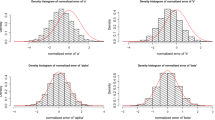Abstract
This paper studies the asymptotic properties of a smoothed least absolute deviations estimator in a nonlinear parametric model with multiple change-points occurring at the unknown times with independent and identically distributed errors. The model is nonlinear in the sense that between two successive change-points the regression function is nonlinear into respect to parameters. It is shown via Monte Carlo simulations that its performance is competitive with that of least absolute deviations estimator and it is more efficient than the least squares estimator, particularly in the presence of the outlier points. If the number of change-points is unknown, an estimation criterion for this number is proposed. Interest of this method is that the objective function is approximated by a differentiable function and if the model contains outliers, it detects correctly the location of the change-points.
Similar content being viewed by others
References
Babu GJ (1989) Strong representations for LAD estimators in linear models. Probab Theory Relat Fields 83: 547–558
Bai J (1995) Least absolute deviation estimation of a shift. Econom Theory 11: 403–436
Bai J (1998) Estimation of multiple-regime regressions with least absolute deviation. J Stat Plan Inference 74: 103–134
Bai J, Perron P (1998) Estimating and testing linear models with multiple structural changes. Econometrica 66(1): 47–78
Bassett G, Koenker R (1978) Asymptotic theory of least absolute error regression. J Am Stat Assoc 73: 618–622
Bhattacharya PK (1994) Some aspects of change-point analysis. IMS Lecture Notes-Monograph Series, vol 23. Hayward, CA, pp 28–56
Ciuperca G (2009a) The M-estimation in a multi-phase random nonlinear model. Stat Probab Lett 75(5): 573–580
Ciuperca G (2009b) Estimating nonlinear regression with and without change-points by the LAD method. Ann Inst Stat Math (in press). see http://www.ism.ac.jp/editsec/aism/forthcoming_all.html
Ciuperca G, Dapzol N (2008) Maximum likelihood estimator in a multi-phase random regression model. Statistics 42(4): 363–381
DasGupta M, Mishra S (2007) Least absolute deviation estimation of linear econometric models: a literature review. MPRA paper no. 1781
Dielman TE (2005) Least absolute value regression: recent contributions. J Stat Comput Simul 75(4): 263–286
Feder PI (1975a) On asymptotic distribution theory in segmented regression problems-identified case. Ann Stat 3: 49–83
Feder PI (1975b) The log likelihood ratio in segmented regression. Ann Stat 3: 84–97
Hitomi K, Kagihara M (2001) Calculation method for nonlinear dynamic least-absolute deviations estimator. J Jpn Stat Soc 31(1): 39–51
Kim HK, Choi SH (1995) Asymptotic properties of non-linear least absolute deviation estimators. J Korean Stat Soc 24: 127–139
Koenker R, Bassett G (1982) Test of linear hypotheses and l 1 estimation. Econometrica 50: 1577–1583
Koul HL, Qian L (2002) Asymptotics of maximum likelihood estimator in a two-phase linear regression model. J Stat Plan Inference 108: 99–119
Koul HL, Qian L, Surgailis D (2003) Asymptotics of M-estimators in two-phase linear regression models. Stoch Process Appl 103: 123–154
Lavielle M, Moulines E (1997) Dtection de ruptures multiples dans la moyenne d’un processus alatoire. CRAS 324: 239–243
Lavielle M, Moulines E (2000) Least-squares estimation of an unknown number of shifts in a time series. J Time Ser Anal 21(1): 33–59
Liu J, Wu S, Zidek JV (1997) On segmented multivariate regressions. Stat Sin 7: 497–525
Oberhofer W (1982) The consistency of nonlinear regression minimizing the L 1-norm. Ann Stat 10(1): 316–319
Pollard D (1991) Asymptotics for least absolute deviation regression estimators. Econom Theory 7: 186–199
Rukhin AL, Vajda I (1997) Change-point estimation as a nonlinear regression problem. Statistics 30(3): 181–200
Wang L, Wang J (2004) The limiting behavior of the least deviation estimators for threshold autoregressive models. J Multivar Anal 89: 243–260
Weiss AA (1991) Estimating nonlinear dynamic models using least absolute error estimation. Econom Theory 7: 46–68
Yao YC (1988) Estimating the number of change-points via Schwarz’s criterion. Stat Probab Lett 6: 181–189
Author information
Authors and Affiliations
Corresponding author
Rights and permissions
About this article
Cite this article
Ciuperca, G. Penalized least absolute deviations estimation for nonlinear model with change-points. Stat Papers 52, 371–390 (2011). https://doi.org/10.1007/s00362-009-0236-6
Received:
Revised:
Published:
Issue Date:
DOI: https://doi.org/10.1007/s00362-009-0236-6




